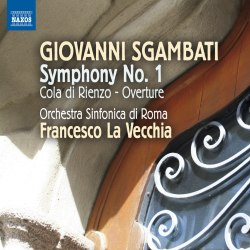| 
|
Giovanni SGAMBATI (1841-1914)
Cola di Rienzo [18:24]
Symphony No. 1 in D minor, Op. 16 [42:52]
Rome Symphony Orchestra/Francesco La Vecchia
rec. 16-17 October (Cola) and 4-5 December (Symphony), 2011, Auditorium di Via Conciliazione, Rome, Italy
NAXOS 8.573007 [61:17]
Giovanni Sgambati’s Symphony No. 1 is my favourite issue so far in the Naxos Italian Classics series.
Sgambati was a pianist who studied with Liszt and composed in the late 1800s; his overture Cola di Rienzo shows the strong influence of Lisztian tone poems, but the symphony (c. 1881) is both more substantial and lighter in tone.
According to the booklet, Grieg and Saint-Saëns were admirers of the symphony, and comparisons have been made with Goldmark’s Rustic Wedding; it’s also easy to imagine Tchaikovsky liking the piece. Think of the lighter Tchaikovsky, like the Italian travel pieces or the four big orchestral suites. Sgambati’s symphony is in D minor, but it is no tragedy; instead the near-constant blending of major and minor is used as a spice, adding extra flavour to a tasty stew of moonlit serenades and rustic dances.
One of the surprises of the Naxos Italian Classics series has been that some composers who devoted themselves primarily to operas couldn’t pen memorable melodies. Sgambati does not have that problem: the symphony opens with a catchy tune. The scherzo - which again rapidly jumps from minor to major keys - is irresistible. The fourth-movement serenade is a spooky nocturne that’s very well-scored for a reduced ensemble. The finale takes off like a rocket, with tarantella rhythms, big powerful brass, and energy levels that rank alongside the most exciting symphonies of the period. I should note that although Sgambati doesn’t use cymbals or other unusual percussion, he is a master with the brass, which really help drive the outer movements.
In other words, the symphony is terrific and completely enjoyable. Cola di Rienzo is certainly fun too, but its Lisztian self-seriousness appeals to a different kind of listener. It doesn’t hurt that this is some of the Rome Symphony Orchestra’s best playing in the series so far, especially from those brass players. The performances are as infectious as the music.
There is a weird echoey, glassy sonic defect which affects the violins at times; I’m not sure if it’s my download copy (purchased from ArkivMusic USA in 2012) or the recording itself. My colleague David Barker couldn’t hear any problems, but reviewers on other websites have complained. Every other section of the orchestra generally sounds fine, and the problem is not enough to keep this from being one of the best of the Naxos Italian issues. Sgambati wrote two more symphonies, and they were performed but never published. I very much hope they will be recorded.
Brian Reinhart
 |
 |
|



 All Nimbus reviews
All Nimbus reviews








